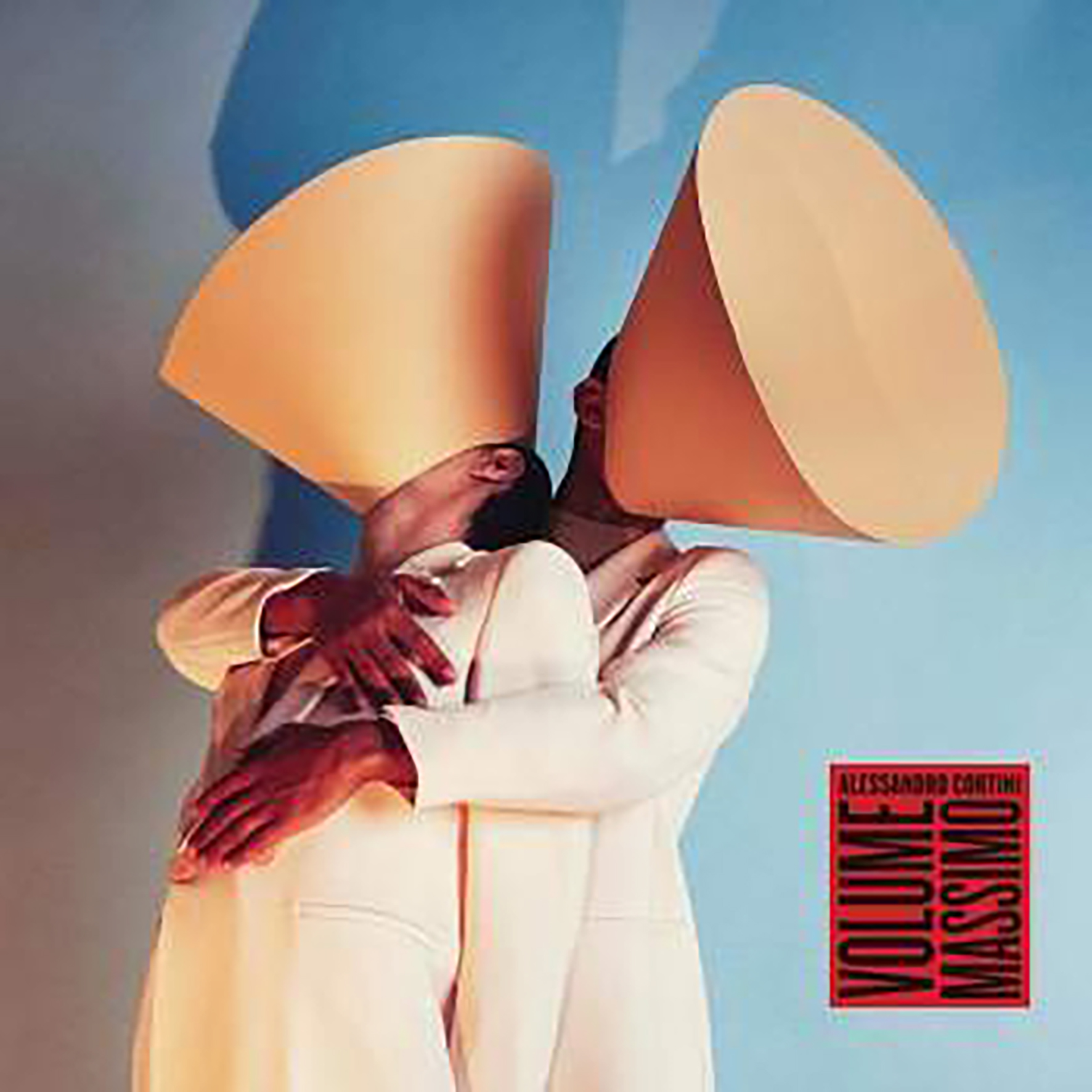Alessandro Cortini, "Volume Massimo"
 My ears rarely perk up at the prospect of any artist releasing a modular synth album, but Alessandro Cortini's recent career has been a wonderful exception thus far: some of the pieces on his Buchla-centric debut (2013's Forse) absolutely floored me. Moreover, he has yet to disappoint me since, as the handful of albums that followed in Forse's wake have largely adhered to that same impressively high level of quality: Cortini almost never releases a solo full-length that does not boast at least two legitimately amazing pieces. As such, he has definitively earned a place in my personal pantheon of great contemporary synth composers. Great artists tend to be great, however, because they restlessly expand and reshape their vision with new tools, new influences, and new ideas. In keeping with that tendency, Volume Massimo (Cortini's first album for Mute) marks a fairly significant stylistic departure from previous releases. For one, there are guitars. And on a structural level, many of these songs adhere to a very "pop" framework, which I suppose makes Mute the perfect home for this phase of Cortini's career: some songs on Volume Massimo song like they could have been deep cuts or instrumental B-sides from classic '80s synth pop albums. Other songs, however, still sound characteristically slow-burning and majestic. Those pieces tend to be the better ones (but not always).
My ears rarely perk up at the prospect of any artist releasing a modular synth album, but Alessandro Cortini's recent career has been a wonderful exception thus far: some of the pieces on his Buchla-centric debut (2013's Forse) absolutely floored me. Moreover, he has yet to disappoint me since, as the handful of albums that followed in Forse's wake have largely adhered to that same impressively high level of quality: Cortini almost never releases a solo full-length that does not boast at least two legitimately amazing pieces. As such, he has definitively earned a place in my personal pantheon of great contemporary synth composers. Great artists tend to be great, however, because they restlessly expand and reshape their vision with new tools, new influences, and new ideas. In keeping with that tendency, Volume Massimo (Cortini's first album for Mute) marks a fairly significant stylistic departure from previous releases. For one, there are guitars. And on a structural level, many of these songs adhere to a very "pop" framework, which I suppose makes Mute the perfect home for this phase of Cortini's career: some songs on Volume Massimo song like they could have been deep cuts or instrumental B-sides from classic '80s synth pop albums. Other songs, however, still sound characteristically slow-burning and majestic. Those pieces tend to be the better ones (but not always).
The album opens in deceptively heavy and promising fashion with "Amore Amaro," which feels like a perfectly reasonable progression from 2017's excellent Avanti.As is generally the case with analog synth compositions, "Amore Amaro" is essentially just a couple of simple themes intertwined, yet a master like Cortini can wring a surprising amount of dynamic activity and emotional depth from a handful of repeating notes.In the case of this piece, Cortini marries a repeating two-note pulse with a burbling, subterranean arpeggio pattern.As the piece progresses, however, the pulsing notes become unpredictably frayed and distressed-sounding, a mysterious voice recording creeps into the background, and some roiling guitars build towards a noisy, volcanic crescendo.In short, it is a classic (if somewhat dramatic) Alessandro Cortini piece that just happens to incorporate guitars. Unfortunately, it is also the best piece on Volume Massimo by a large margin until a second highlight eventually appears in the form of "Sabbia" (the second-to-last piece on the album).
As much as I like "Amore Amaro," "Sabbia" is the piece that best illustrates the wonderful shape that this more pop-minded direction could have taken (and may very well still take someday).The heart of the piece is an understated and gorgeously melancholy guitar figure, but that motif is nested in a lurching, slow-motion groove that sounds like a worn tape played at the wrong speed.That alone would be grist for a fine piece, but it turns out to only be the backdrop for something even better, as the guitars are unexpectedly pushed aside for a gnarled and strangled melody.Cortini has rarely been in finer form, as he manages to create something that is both achingly lovely and evocative of a wounded machine straining to emerge from a pool of incredibly viscous liquid.Moreover, he does it in a way that has a genuinely satisfying structural arc: great sounds, great melodies, flawless pacing, and a seamless and organic dynamic evolution–Cortini hits the mark on every possible count. 
What lies between the two pillars of "Amore Amaro" and "Sabbia," however, is a more of an ambiguous achievement, teetering unpredictably between perplexing misfires and promising ideas that do not quite make the leap into great songs.On the promising side of that equation, I am most fond of "La Storia" and "Batticuore," two pieces which diverge quite significantly from one another."Batticuore" is the best of Cortini’s pure synth-pop forays, as a simple lilting melody unfolds over a thick and throbbing bass pulse.It is even structured like a pop song, with clearly delineated verses and choruses, though Cortini ratchets up the intensity to non-pop levels with roaring layers of guitars as the piece builds.It is a perfectly likable piece, but I cannot shake the sense that it sounds like an unexpectedly explosive cover of a minor OMD song."La Storia," on the other, feels like it could have been an improvisation, as it unfolds as a stuttering and gnarled melody of blurting synth tones that eventually erupts into a crescendo of buzzing, sizzling, and swooping sci-fi psychedelia.It is quite a cool piece, but it feels a bit half-formed and suffers from a predictable, formulaic arc: Cortini has an exasperating tendency to steer almost every piece to…uh…volume massimo by simply making his chords louder and more layered. I vastly prefer the less bombastic moments, like the seething and hissing closer "Dormi," but they are the exception rather than the rule.
That brings me to the "perplexing misfire" category, which is best exemplified by another piece that sounds plucked from an early ‘80s OMD album: "Momenti."Unlike "Batticuore," however, "Momenti" does not sound like classic synthpop fare–it sounds like what would have resulted if an Eastern Bloc country had commissioned them to compose an anthem for the Olympics. I cannot imagine that was what Cortini was hoping to achieve, but there is no accounting for taste.Given how devoted Cortini is to vintage/analog synthesizers, it is highly likely that he absorbed quite a lot of now-dated electronic pop in his youth and that it had a lasting impact on his aesthetic.Cortini seems far too exacting to wind up in such a place by sheer misadventure.
All of that adds up to quite a strange roller coaster of an album, as Volume Massimo frustrates, dazzles, and baffles me in equal measures over the course of its duration. I genuinely wish I liked it more, as it was a gutsy gamble for Cortini to stretch so far out of his comfort zone on such a high profile release.Moreover, his working methods do not seem to lend themselves very well to what he set out to do: there are a few songs that have more complicated structures and moving parts than the others, but most of these songs are essentially just a couple of cool patches that unfold with escalating intensity until they end.Historically, that approach has produced some truly transcendent results in Cortini’s moodier, more slow-building pieces.In the tighter and more condensed "pop" structures of this album, however, it can feel a bit rushed and overdramatic.That said, the album also contains "Sabbia," which easily exceeded my wildest expectations for how this direction might turn out.Moreover, even some of the weakest pieces contain some winderful and inventive ideas that fall a bit flat in their execution ("Momenti," for example, has a strangely rattling and lo-fi guitar outro). Volume Massimo does not suffer from lack of inspiration–the pieces just do not quite fit together properly.Ultimately, those stronger moments fail to amount to a whole that rivals Cortini’s impressive run of previous albums, but I certainly respect how beautifully some of these seemingly overreaching experiments worked out.
Samples:



